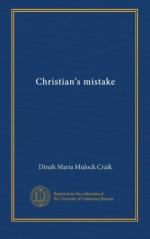As she was to Oliver, who, wakening at the storm in the nursery, took to sleepy crying, and was immediately lulled in her arms with the fondest soothing; the fiercest threatenings between whiles being directed to Letitia and Arthur, until they both slunk off to bed, sullen and silent—at war with one another, with Phillis, and with the whole world.
But children’s woes are transient. By-and-by Titia’s fretful face settled into sleepy peace; the angry flush melted from Arthur’s hot cheeks; Oliver had already been transferred to his crib; and Phillis settled herself to her sewing, queen regnant of the silent nursery.
Meanwhile, at the other end of the ghostly gallery, sat, over the dining-room fire, the two other rulers, guardians, and guides of these three children—“the aunts”—Miss Gascoigne and Miss Grey; for these ladies still remained at the Lodge. Dr. Grey had asked Christian if she wished them to leave, for they had a house of their own near Avonsbridge, and she had answered indifferently, “Oh no; let them do as they like.” As she liked did not seem to enter into her thoughts. Alas! that sacred dual solitude, which most young wives naturally and rightfully desire, was no vital necessity to Christian Grey.
So the two ladies, who had come to the Lodge when their sister died, had declared their intention of remaining there, at least for the present, “for the sake of those poor, dear children.” And, dressed in at their best, they sat solemnly waiting the arrival of the children’s father and step-mother—“that young woman,” as they always spoke of her in Avonsbridge.
What Dr. Grey had gone through in domestic opposition before he married, he alone knew, and he never told. But he had said, as every man under similar circumstances has a right to say, “I will marry,” and had done it. Besides, he was a just man; he was fully aware that to his sisters Christian was not—could not be as yet, any more than the organist’s daughter and the silversmith’s governess, while they were University ladies. But he knew them, and he knew her; he was not afraid.




